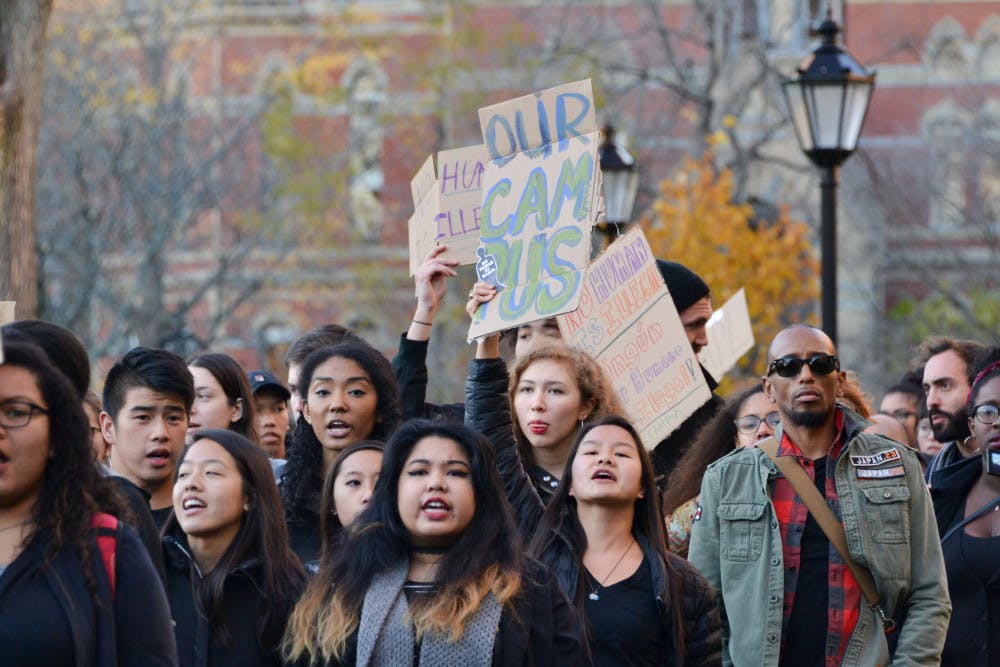In the weeks following the presidential election of Donald Trump, campus has been fraught with discussions on immigration, the possibilities of a sanctuary campus and how best to support undocumented students and those with Deferred Action for Childhood Arrivals status under the Trump administration.
Nov. 14, faculty and staff members sent a petition urging the University to “investigate the possibility of our campus serving as a sanctuary for our students, our staff members and their family members who face imminent deportation.”
Naoko Shibusawa, associate professor of history and American studies and one of the authors of the petition, said that the idea arose while talking to students the day after the election. “I was trying to think about ways to deal with the hopelessness, about things that we could possibly do. And the undocumented immigrant students were the most vulnerable.”
Other faculty members quickly joined and helped her edit the draft of the petition, Shibusawa said. “What’s interesting about this is it was a bunch of people who were having this idea independently,” she added.
Immediately following, petitions written by students, graduate students and alums were circulated, as were demands listed by students involved in the Nov. 16 Our Campus student walkout.
President Christina Paxson P’19 and Provost Richard Locke responded to these petitions in a Nov. 16 op-ed in The Herald, stating that legal counsel had informed them that universities and colleges cannot “offer legal sanctuary from members of law enforcement or Immigration and Customs Enforcement.” Still, they assured the community that the University would provide resources to assist students potentially facing deportation, such as undocumented students and students under the DACA program.
“While we wish we could offer absolute protection to members of our community who are threatened by possible changes in policy, it would be irresponsible to promise protections that we cannot legally deliver,” Paxson and Locke wrote.
“The message that they couldn’t wasn’t a message that people needed to hear at the time,” Shibusawa said.
Shibusawa said she was disappointed the University didn’t take the symbolic stand of declaring itself a sanctuary campus like Columbia, even though the policies the administration has put forth “don’t seem very different” from those of Columbia.
“I think they want to do everything they can, and … they’re sending the right message,” said Ross Cheit, professor of political science.
Days after stating that the University could not be a sanctuary campus in all the ways the various petitions suggested, Paxson signed a statement that called for the DACA program to be upheld and expanded.
“It symbolizes Brown University’s commitment to supporting undocumented students and DACA-mented students,” said Kevin Escudero, a postdoctoral fellow in American studies who is serving as a faculty mentor to undocumented and DACA-status students. Escudero hopes the statement will help students with DACA status “feel included and that their needs are at the forefront of what senior administration are thinking about,” he added.
While students on the “Our Campus Walkout” Facebook event page have criticized the administration for not adopting the term “sanctuary campus” like other universities, some faculty members said the policies adopted by the University are indicative of the phrase.
“Some campuses may choose to call themselves sanctuary campus, but others may be concerned with federal funding and political statements,” Escudero said, adding that the policies are what really matter.
Even though the policies the University is adopting are similar to those of campuses who call themselves sanctuaries, Shibusawa said she thinks the symbolic stand of naming the University a sanctuary is important. “Columbia gets to be a leader on this,” she said, adding, “Brown had an opportunity to be a leader on this as well and didn’t take it.”
Though Cheit signed the faculty and staff petition, he said he doesn’t think that becoming a sanctuary campus is legally possible — even for private universities. “I think it sounds like it means more than it can ultimately mean. We can’t become a sanctuary from U.S. law.”
“I think the first response is caution because universities have a lot of responsibilities they have to be aware of,” Shibusawa said. The fact that most individuals registered as Republicans voted for Trump indicates the likelihood that many University alums and donors also voted for him, she added.
A core set of policies that would make the University a “de facto sanctuary” would include safeguarding student information from federal immigration authorities, assuring non-compliance between campus security and immigration and customs enforcement agents and providing resources and protocols to best support and understand individuals who are undocumented, Escudero said.
Many faculty members plan to continue to push for policies that will support minority students under a potentially hostile Trump administration.
Escudero said he hopes discussions will continue in the framework of preexisting structures created by the Diversity and Inclusion Action Plan in order to make the campus environment “one that is supportive and inclusive and that allows us to have conversations that can move things forward.”
“We have a ton of resources on campus, so it’s just identifying those resources that can help students,” Escudero said. As a faculty mentor to undocumented and DACA-status students, he will hold office hours for students concerned about their status and will train staff on how best to support the undocumented community, he added.
Cheit, Escudero and Shibusawa all expressed that the immediate reactions by students, faculty and staff members and alums need to be maintained if they are to be effective in protecting students facing potential immigration issues in the future.
“A walkout is a one-time sort of thing, but we have to have some kind of sustained presence,” Shibusawa said. “It doesn’t mean that we always have to be on the street, but being on the street is not a bad place to be.”





